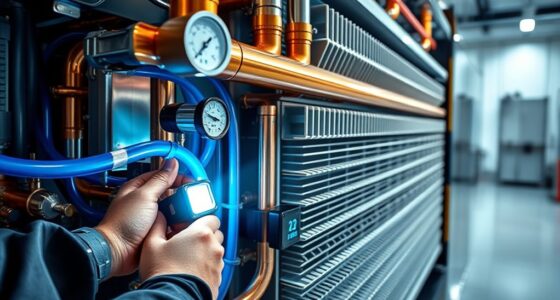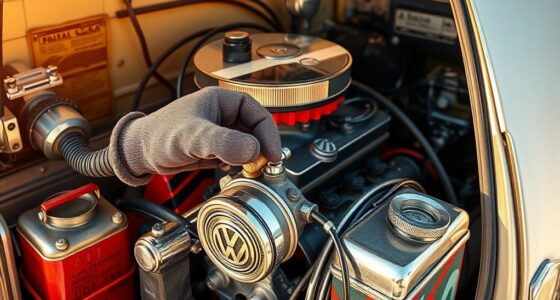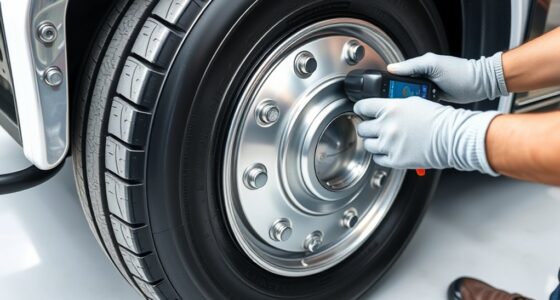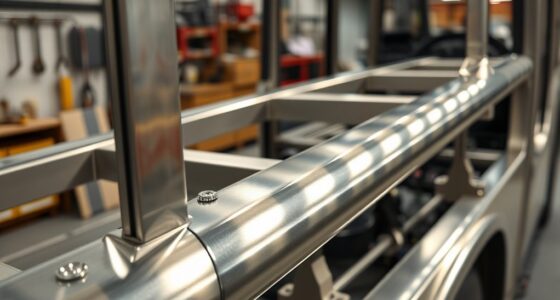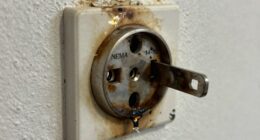To prolong your VW bus motor’s life, regularly clean and inspect the cooling fins to guarantee proper airflow and prevent overheating. Change your oil and filter on schedule to help dissipate heat and keep internal components lubricated. Keep an eye on oil quality and levels for ideal cooling. Proper maintenance of both the cooling system and oil prevents damage and extends engine longevity. Continue exploring how these simple steps can keep your engine running smoothly.
Key Takeaways
- Regularly inspect and clean cooling fins to prevent dirt buildup and ensure optimal airflow.
- Change oil and oil filter consistently to maintain proper lubrication and heat dissipation.
- Keep ventilation paths clear of debris and obstructions for efficient engine cooling.
- Use manufacturer-recommended oil grades to enhance internal cooling and reduce engine wear.
- Monitor for oil leaks or burning smells, addressing issues promptly to prevent overheating and damage.

Air-cooled engines rely on airflow to stay cool, making proper maintenance essential for ideal performance and longevity. Unlike liquid-cooled engines that use radiators and coolant, air-cooled engines depend on a well-functioning cooling system to prevent overheating. Your cooling system, which includes fins, shrouds, and ventilation paths, must be clean and unobstructed to allow air to flow freely over the engine surfaces. Neglecting this can cause the engine to run hotter than intended, increasing wear and risking damage. Regularly inspect the cooling fins for dirt, debris, or damage, and clean them gently with compressed air or a soft brush. Ensuring proper airflow keeps the engine operating at optimal temperatures, reducing strain on internal components.
Oil maintenance is equally crucial in air-cooled engines. Since these engines lack a liquid cooling system, oil plays a vital role in heat dissipation and lubrication. Over time, oil breaks down and becomes contaminated with dirt, metal particles, and combustion byproducts. If you ignore oil changes, the oil’s ability to cool engine parts diminishes, and friction increases, leading to faster engine wear. Check your oil levels frequently and change the oil according to the manufacturer’s recommended schedule—typically every 3,000 to 5,000 miles or once a year if used less frequently. Use the correct grade of oil specified for your VW bus engine to ensure proper lubrication and heat transfer. During oil changes, don’t forget to replace the oil filter, as a clogged filter hampers oil flow and cooling.
In addition to regular oil changes, pay attention to oil leaks or burning oil smell, which could indicate gasket failures or other issues. Maintaining proper oil levels and quality helps keep the engine’s internal parts cool and lubricated, preventing overheating and reducing the risk of engine failure. Your cooling system and oil maintenance are interconnected; a clean cooling system ensures better airflow over the engine, while fresh, high-quality oil assists in heat dissipation from internal components.
Frequently Asked Questions
How Often Should I Perform an Engine Tune-Up?
You should perform an engine tune-up every 3,000 to 5,000 miles or as recommended by your vehicle’s manual. During this, replace the spark plugs and check the valve adjustment to guarantee peak performance. Regular tune-ups prevent engine issues and improve efficiency. Keep an eye on engine performance, and don’t forget that timely spark plug replacement and valve adjustments are key to keeping your VW bus running smoothly.
What Type of Oil Is Best for My VW Bus Engine?
Imagine your VW bus engine as a vintage jazz record needing smooth playback. You should opt for synthetic oil with the right oil viscosity, like 10W-30 or 20W-50, to keep things running smoothly. Synthetic oils provide better lubrication and protection under heat, helping your air-cooled engine last longer. Make sure to choose oil that matches your engine’s specific needs, ensuring a harmonious and reliable ride every time.
How Can I Identify Early Signs of Engine Overheating?
You should watch for early signs of engine overheating, like coolant leaks around the engine or radiator, which indicate a cooling issue. Keep an eye on oil discoloration—if it turns milky or darker than usual, it’s a red flag. Also, notice if the temperature gauge rises above normal or if you hear knocking sounds. Address these signs promptly to prevent serious damage and keep your VW bus running smoothly.
Are There Specific Air Filter Maintenance Tips for Air-Cooled Engines?
You can’t ignore your air filter if you want your engine to roar like a lion, not gasp for breath! Regularly inspect your air filter for dirt and debris—think of it as a crucial breath mask. If it looks clogged or dusty, replace it immediately. Keeping your air filter clean ensures peak airflow, prevents overheating, and keeps your VW bus running smoothly for miles and miles.
What Is the Recommended Coolant or Oil Additive for Cooling?
You might wonder about coolant alternatives or oil additive options for your VW bus engine. Since air-cooled engines don’t use water-based coolant, focus on high-quality engine oil with additives that improve cooling and lubrication. Look for oil additives designed for air-cooled engines, which can help dissipate heat more effectively. Always follow manufacturer recommendations to guarantee your engine stays cool and runs smoothly, avoiding unnecessary overheating or wear.
Conclusion
Taking good care of your VW bus’s air-cooled engine is key to keeping it running smoothly for years to come. Regular maintenance, monitoring oil levels, and staying attentive to any signs of trouble can prevent small issues from snowballing into big headaches. Remember, an ounce of prevention is worth a pound of cure—so stay proactive, give your engine the love it needs, and you’ll keep cruising without a hitch.


